De Duitse dichter, schrijver en filmmaker Michael Roes werd geboren op 7 augustus 1960 in Rhede. Zie ook mijn blog van 7 augustus 2010 en eveneens alle tags voor Michael Roes op dit blog.
Uit: Geschichte der Freundschaft
“Wir sitzen am Strand reden über sein Studium, über Literatur und Philosophie und über die Schwierigkeiten des Übersetzens. Plötzlich ändert sich sein Ton. Heute Nacht habe ich von dir geträumt, sagt er. Im Traum hattest du die Gestalt eines Elefanten. Aber ich wusste von Anfang an, dass du es warst. Zunächst fürchtete ich, du würdest alles zertrampeln, die Obstkisten vor den Geschäften, die Tische und Stühle vor den Cafés. Doch du bewegst dich ganz vorsichtig durch die enge Straße, lässt dich von den Kindern streicheln und hebst die Mutigeren von ihnen mit deinem Rüssel sogar auf deinen Rücken. Als du dann mich packst, bekomme ich doch Angst. Ich will etwas rufen, aber halte dann lieber den Mund, um den Elefanten nicht zu erschrecken.”
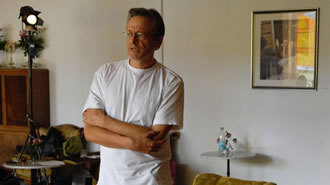
Michael Roes (Rhede, 7 augustus 1960)
De Australische schrijver John Birmingham werd geboren op 7 augustus 1964 in Liverpool, Engeland. Zie ook alle tags voor John Birmingham op dit blog.
Uit: Final Impact
“D-Day. 3 May 1944. 0300 hours.
In transit.
The lead helicopter hammered across the English Channel at the edge of its performance envelope, close enough to the waves that Lieutenant Gil Amundson thought he could feel a fine mist of sea spray stirred up by their passage through the darkness.
The seven men in his chalk were quiet, each alone in his own cocoon of anticipation and fear. Amundson could hear Sergeant Nunez beside him, reciting rapid-fire Hail Marys, working through a set of rosary beads in what looked to the young cavalry officer like record time. Across the cabin Private Clarke was nervously tapping his heel on the steel plating of the floor, the tempo increasing until it sounded like one of those rock-and-roll drummers. Then he’d curse, punch himself on the leg, and go still for a moment before starting all over again.
On either side of him a couple of the boys were dozing fitfully. Or at least pretending to.
That’s how it went the whole way across. Each man playing out what might be his last hour as he saw fit. Some checked their equipment, before checking their buddy’s. Some leaned over to get a view of the invasion fleet as it headed for the coast. Corporal Gadsden craned his head skyward, the bulky lens of his Gen2 Starlite goggles tracking his gaze as he picked out Dakotas, gliders, Mustang night fighters, and, at one point, a squadron of Sabers miles overhead, all screaming toward France.
Amundson forced himself to go through the plan again. The rapid insertion, the assembly point for his platoon, the mental map of their objective.
He used what little space he had in the chopper to perform a set of isometric exercises, lest his butt fall asleep before they jumped into Hitler’s front garden. He stretched his arms and legs and craned his neck from side to side, a full extension in each direction, which gave him a clear view of the rest of the cav squadron as it thundered toward the enemy in 132 Hueys, with another forty Cobra gunships riding shotgun”.
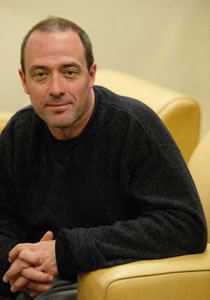
John Birmingham (Liverpool, 7 augustus 1964)
De Russische schrijver Vladimir Sorokin werd geboren op 7 augustus 1955 in Bykovo bij Moskou. Zie ook mijn blog van 7 augustus 2010 en eveneens alle tags voor Vladimir Sorokin op dit blog.
Uit: Ice Trilogy
“Miss, would you deign to share this modest meal with me?” an old voice with a strange accent sounded next to her.
Olga lowered her eyes and saw an old man sitting alone at a table. All of the tables here were for two, but most of them were pushed together to form national groups. Virtually no loners remained. She hadn’t noticed this old man earlier.
“Believe me, I wouldn’t dare to insist. if you have other preferences, do not hesitate to follow them. But I would be extraordinarily touched even by your brief presence at this miserable little table.”
He spoke perfect, terribly old-fashioned English. But the accent indicated that the old man wasn’t English. Olga placed her tray on his table and sat down across from him.
“Marvelous. I thank you.” The old man stood, his shaking hands raising his napkin to his narrow, colorless lips and wiping them. “Let me introduce myself — Ernst Wolf.”
“Olga Drobot,” she said, reaching over the food to shake his hand.
The old man touched his lips to her hand. His bald head trembled slightly.
“You betrayed us with the Jerries.” The Russian table laughed caustically.
“Are you German?” Olga asked.
“Yes.”
“Why don’t you sit at the German table? There are so many of you here.”
“There are two reasons, my dear Miss Drobot. First, in the course of fifty-eight years of imprisonment, I have come to understand that solitude is a gift from on high. Second, I simply have nothing to talk about with my current compatriots. We have no common themes.”
“And you think that they will emerge with me?” Olga broke off a piece of her roll.
“You reminded me of a certain lady who was very dear to me. A very long time ago.”
“And it was only for this that you . . .” Olga lifted her fork to put a piece of fish in her mouth but suddenly realized exactly what he had told her. “What? Fifty-eight years? You’ve been here fifty-eight years?”
“Well, not exactly here.” He smiled, baring his old dentures. “But with them. With the Brothers of the Light.”
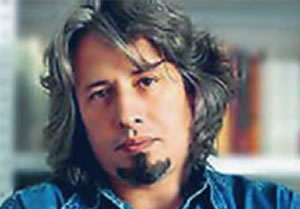
Vladimir Sorokin (Bykovo, 7 augustus 1955)
De Nederlandse dichter en prozaïst Cees Buddingh’ werd op 7 augustus 1918 geboren in Dordrecht. Zie ook alle tags voor Cees Budding’ op dit blog.
Zo zijn onze manieren
op dfc-reünies
hoor je altijd veel sterke verhalen
maar zelden zo sterk en frappant
als dit jaar van leo van bruggen
hij (leo) zat op het gymnasium
toen zijn leraar nederlands over
moderne poëzie kwam te praten
en een aantal namen noemde
waaronder ook de naam ‘buddingh’
‘buddingh’, zei leo, die ken ik wel:
die zit altijd elke zondag
bij ons op dfc’.
waarop de leraar sprak: ‘jongen,
ga jij de klas maar uit!’
Een gedicht
Je krijgt de kaarten gedeeld, zelf mag je niets
uitzoeken, er hooguit één of twee
ruilen, en dan nog alleen een vier voor een zes,
of – als ’t meezit – een tien voor een boer, verder moet je maar zien.
‘Spelen maar!’ roept een stem. Maar je kent zelfs de regels
niet. Hoe moet het? Wat doe je? Je schudt ze en legt
ze uit op de tafel. Misschien is ’t toch best leuk. Soms lijkt het
net of er iets uitkomt: hapt er een vrouw in een aas.
Maar soms gooit er een hand plots een kaart op: je moet bekennen.
Je aarzelt, weet het niet, hijgt, bijt een stuk uit je lip:
onmiddellijk is de hand er met leukoplast.
‘Dank je wel’, zeg je. Maar moet je nu ook al de heer
en de negen opgooien? Dan houd je toch niets meer over?
En het schemert al half. En het licht doet het ook niet meer.
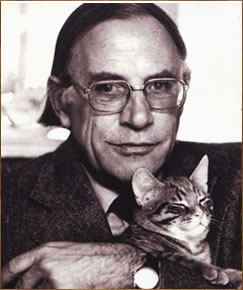
Cees Buddingh’ (7 augustus 1918 – 24 november 1985)
De Amerikaanse schrijver en radiomaker Garrison Keillor werd geboren op 7 augustus 1942 in Anoka, Minnesota. Zie ook alle tags voor Garrison Keillor op dit blog.
Uit: Good Poems: American Places
“In the classic tradition, poets strove for universality, and so Emily Dickinson did not tell us if the Horses whose heads turned toward Eternity were Percherons or Shetland ponies, nor if the narrow fellow in the grass was a black snake or a garter. Nor did Robert Frost have a specific boy swing on those birches, wearing U.S. Keds and blowing Fleer’s bubblegum while singing “Alexander’s Ragtime Band.” Serious poets did not step in the mundane for fear it would date them, diminish the universality, and perhaps also because — well, because America was rather vulgar with all those asphalt parking lots and shopping malls — and poets felt obliged to rise above the vulgar immediate, up to the distant ideal.
The upward-striving poets are happy enough to drop European places into their work — In a café in Verona, I suddenly thought of my father — romantic places (Rome, Genoa, Venice, Paris of course) being preferable to Sweden or (arghh) Germany — which paid off twice: (1) you immediately elevated yourself by placing yourself in Paris, smoking a Gitane, sipping Pernod, walking in the footsteps of legends, and (2) you could write with a freer hand, knowing your American readers could not hold you so closely to account as they would if the poem were set in the middle of Kansas. And maybe the Upward-Strivers hoped their work might be lionized in the Times Literary Supplement — so, better to leave out the reference to one on, two out, in the bottom of the ninth.”
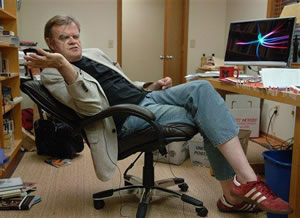
Garrison Keillor (Anoka, 7 augustus 1942)
Zie voor nog meer schrijvers van de 7e augustus ook mijn vorige blog van vandaag.
